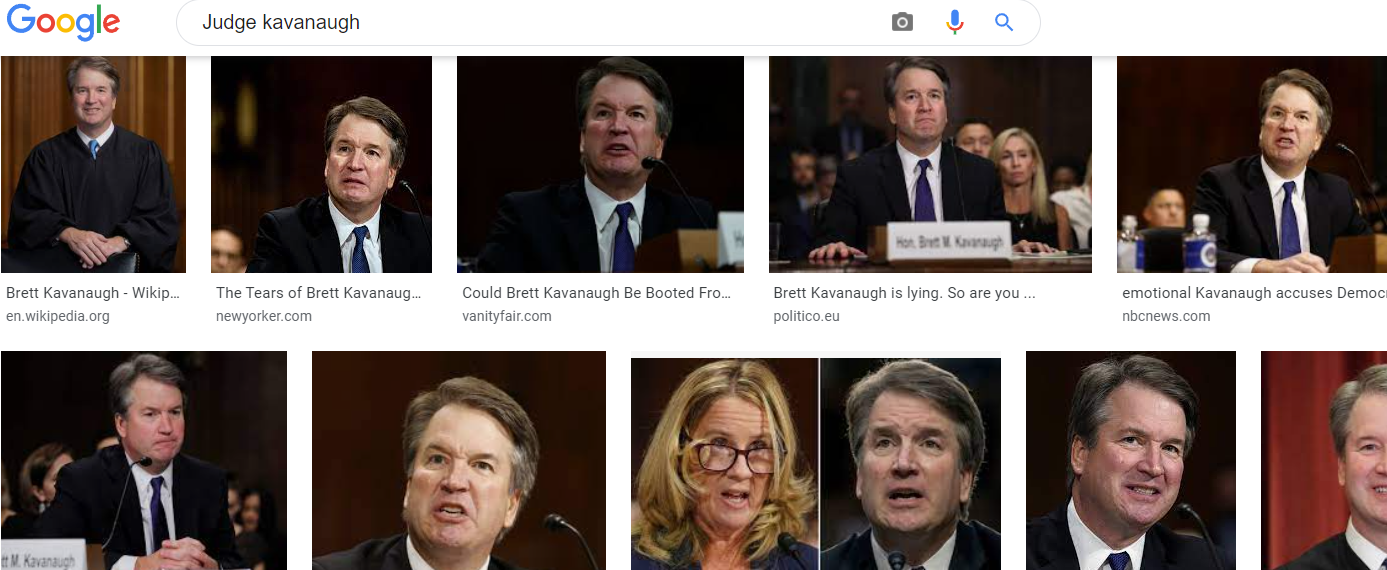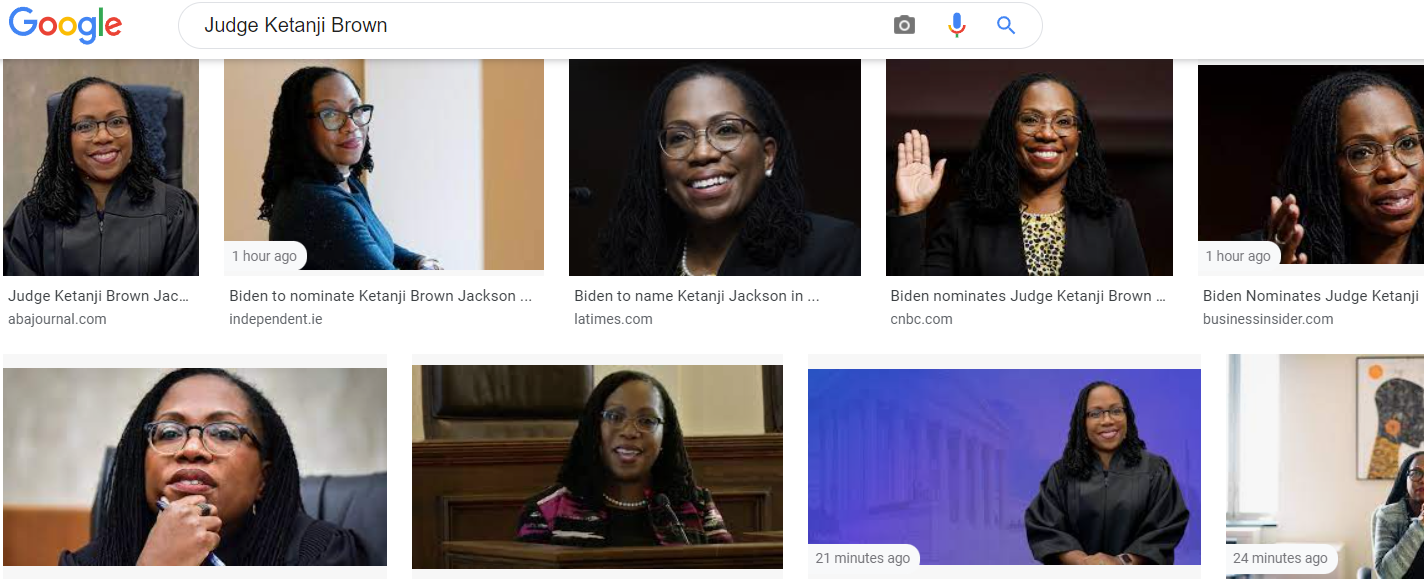Originally posted by Jiggaboo_Johnson
"Fuck qualifications and a fair process, we needs us a nigga woman!" - he stated to his advisors.
I'm sure she'll be happy knowing she got the job because she's a nog.
You're right again, Jiggly Booty. SHE'S A FUCKING NO-GOOD SLACKER!
Ketanji Brown Jackson
From Wikipedia, the free encyclopedia
Born Ketanji Onyika Brown
September 14, 1970 (age 51)
Washington, D.C., U.S.
Spouse(s) Patrick Jackson (m. 1996)
Children 2
Education Harvard University (AB, JD)
Ketanji Brown Jackson (born September 14, 1970)[1] is an American attorney, and jurist serving as a federal judge on the United States Court of Appeals for the District of Columbia Circuit. She was nominated to the Supreme Court of the United States by President Biden on February 25, 2022.[2][3] Prior to her elevation to an appellate court and from 2013 to 2021, she served as a district judge on the United States District Court for the District of Columbia. Jackson was also Vice Chair of the United States Sentencing Commission from 2010 to 2014. Since 2016, she has been a member of the Harvard Board of Overseers.
Born in Washington, D.C., and raised in Miami, Florida, Jackson attended Harvard University for college and law school, where she served as an editor on the Harvard Law Review. She began her legal career with three clerkships, including one with U.S. Supreme Court Associate Justice Stephen Breyer.
After Breyer announced his retirement in January 2022, President Joe Biden declared his intent to nominate an African American woman as the next justice of the Court, honoring a promise he made during the 2020 Democratic primaries.[4] On February 25, 2022, Biden announced that he would nominate Jackson to the Supreme Court.[5][6]
Early life and education
Ketanji Onyika Brown was born on September 14, 1970, in Washington, D.C.[7][8] Her parents were both graduates of historically black colleges and universities.[9][7][10] Her father, Johnny Brown, ultimately became the chief attorney for the Miami-Dade County School Board; her mother, Ellery, served as school principal at New World School of the Arts.[11][12] Jackson grew up in Miami, Florida, and graduated from Miami Palmetto Senior High School in 1988.[8]
After high school, Jackson studied government at Harvard University, graduating in 1992 with an A.B. magna cum laude. When she was in college, her uncle was sentenced to life in prison due to a nonviolent cocaine conviction. Years later, Jackson persuaded a law firm to take his case pro bono, and President Barack Obama eventually commuted his sentence.[13] Another uncle served as Miami's police chief.[11] During her time at Harvard, Jackson led protests against a student who displayed a Confederate flag from his dorm window.[14] She also performed improv comedy and took classes in drama[15] .
Jackson worked as a staff reporter and researcher for Time magazine from 1992 to 1993, then attended Harvard Law School, where she was a supervising editor of the Harvard Law Review. She graduated in 1996 with a Juris Doctor cum laude.[8][16]
Career
After law school, Jackson served as a law clerk to Judge Patti B. Saris of the U.S. District Court for the District of Massachusetts from 1996 to 1997, then to Judge Bruce M. Selya of the U.S. Court of Appeals for the First Circuit from 1997 to 1998. She spent a year in private practice at the Washington, D.C. law firm Miller Cassidy Larroca & Lewin (now part of Baker Botts), then clerked for Justice Stephen Breyer of the U.S. Supreme Court from 1999 to 2000.[8][17]
Jackson worked in private legal practice from 2000 to 2003.[18] From 2003 to 2005, she served as an assistant special counsel to the United States Sentencing Commission.[19]
From 2005 to 2007, Jackson was an assistant federal public defender in Washington, D.C., where she handled cases before U.S. Court of Appeals for the D.C. Circuit.[20] A Washington Post review of cases Jackson handled during her time as a public defender showed that "she won uncommon victories against the government that shortened or erased lengthy prison terms."[21]
From 2007 to 2010, Jackson was an appellate litigator at Morrison & Foerster.[18][17]
U.S. Sentencing Commission
On July 23, 2009, President Barack Obama nominated Jackson to become vice chair of the United States Sentencing Commission.[22] The U.S. Senate confirmed Jackson by unanimous consent on February 11, 2010. She succeeded Michael E. Horowitz, who had served from 2003 until 2009. Jackson served on the Sentencing Commission until 2014.[23][17] During Jackson's time on the Sentencing Commission, it retroactively amended the Sentencing Guidelines to reduce the guideline range for crack cocaine offenses,[3] and enacted the "drugs minus two" amendment, which implemented a two offense-level reduction for drug crimes.[24]
District Court
Jackson on the bench of the U.S. District Court for the District of Columbia
On September 20, 2012, Obama nominated Jackson to serve as a judge for the United States district court for the District of Columbia to the seat vacated by retiring Judge Henry H. Kennedy Jr.[25] Jackson was introduced at her December 2011 confirmation hearing by Republican Paul Ryan, a relative through marriage, who said "Our politics may differ, but my praise for Ketanji's intellect, for her character, for her integrity, it is unequivocal."[11]
On February 14, 2013, her nomination was reported to the full Senate by voice vote of the Senate Judiciary Committee.[26] She was confirmed by the full Senate by voice vote on March 22, 2013. She received her commission on March 26, 2013.[17]
During her time on the District Court, Jackson wrote multiple decisions adverse to the positions of the Trump administration. In her opinion ordering President Trump's former White House counsel Donald McGahn to comply with a legislative subpoena, she wrote "presidents are not kings."[27] Jackson handled a number of challenges to executive agency actions that raised questions of administrative law. She also issued rulings in several cases that gained particular political attention.[28]
Bloomberg Law reported in spring 2021 that conservative activists were pointing to certain decisions by Jackson that had been reversed on appeal as a "potential blemish on her record."[29] In 2019, Jackson ruled that provisions in three Trump executive orders conflicted with federal employee rights to collective bargaining. Her decision was reversed unanimously by the D.C. Circuit. Another 2019 decision, involving a challenge to a Department of Homeland Security decision to expand the agency's definition of which noncitizens could be deported, was also reversed by the D.C. Circuit. Nan Aron, president of the liberal Alliance for Justice, defended Jackson's record, saying Jackson "has written nearly 600 opinions and been reversed [fewer] than twelve times."[29]
Court of appeals
On March 30, 2021, President Joe Biden announced his intent to nominate Jackson to serve as a United States circuit judge for the U.S. Court of Appeals for the D.C. Circuit.[30] On April 19, 2021, her nomination was sent to the Senate. President Biden nominated Jackson to the seat vacated by Judge Merrick Garland, who stepped down to become attorney general.[31]
On April 28, 2021, a hearing on her nomination was held before the Senate Judiciary Committee.[32] During her confirmation hearing, Jackson was questioned about several of her rulings against the Trump administration.[33] On May 20, 2021, Jackson's nomination was reported out of committee by a 13–9 vote.[34] On June 10, 2021, cloture was invoked on her nomination by a vote of 52–46.[35] On June 14, 2021, the United States Senate confirmed Jackson in a 53–44 vote.[36] She received her judicial commission on June 17, 2021.[37]
Jackson's first decision as a court of appeals judge invalidated a 2020 rule by the Federal Labor Relations Authority that had restricted the bargaining power of federal-sector labor unions.[38]
U.S. Supreme Court speculation
Main article: Ketanji Brown Jackson Supreme Court nomination
Jackson in 2022
On February 26, 2016, the National Law Journal reported that Obama administration officials were vetting Jackson as a potential nominee to the U.S. Supreme Court.[39] In March 2016, The Washington Post[40] and the Associated Press[41] also reported she was under consideration; Reuters reported that Jackson was one of five candidates interviewed as a potential nominee for the vacancy.[42]
In early 2022, news outlets speculated that President Joe Biden would nominate Jackson to the U.S. Supreme Court to fill the seat vacated by Stephen Breyer.[43][44][45][46] Biden pledged during the 2020 United States presidential election campaign to appoint a Black woman to the court, should a vacancy occur.[43] Jackson's appointment to the D.C. Circuit, considered to be the second most influential federal court in the United States, behind only the Supreme Court, was viewed as preparation for a potential promotion to the Supreme Court.[47]
Jackson's potential nomination to the Supreme Court has been supported by civil rights and liberal advocacy organizations.[13] The Washington Post wrote that Jackson's experience as a public defender "has endeared her to the more liberal base of the Democratic Party."[48] While her supporters have touted her history as a public defender as an asset, during her 2021 confirmation hearing, Republicans showed that they could cast her public defender work as a liability.[21]
Legal philosophy
In January 2022, The New York Times reported that Jackson had "not yet written a body of appeals court opinions expressing a legal philosophy," because she had joined the U.S. Court of Appeals for the D.C. Circuit in the summer of 2021. However, they said, Jackson's earlier rulings "comported with those of a liberal-leaning judge," including her opinions blocking various Trump administration actions.[11]
According to Sahil Kapur, writing for NBC News, "Jackson fits well with the Democratic Party and the progressive movement's agenda" due to her relative youth, background as a public defender, and history of labor-friendly rulings.[49]
Politico reported that "Jackson is popular with liberal legal activists looking to replace Breyer with a justice willing to engage in ideological combat with the court's conservatives."[50]
Notable rulings
On September 11, 2013, in American Meat Institute v. U.S. Department of Agriculture, Jackson preliminarily allowed a U.S. Department of Agriculture rule to stand that required meatpackers to identify the animal's country of origin. She found that the rule likely did not violate the First Amendment.[51]
On September 5, 2014, in Depomed v. Department of Health and Human Services, Jackson ruled that the Food and Drug Administration had violated the Administrative Procedure Act when it failed to grant pharmaceutical company Depomed market exclusivity for its orphan drug, Gralise, despite the fact that Gralise met the statutory requirements for exclusivity under the Orphan Drug Act.[52]
On September 11, 2015, in Pierce v. District of Columbia, Jackson ruled that the D.C. Department of Corrections violated the rights of a deaf inmate under the Americans with Disabilities Act because jail officials failed to assess the inmate's need for accommodations when he first arrived at the jail.[53]
In April and June 2018, Jackson presided over two cases challenging the Department of Health and Human Services’ decision to terminate grants for teen pregnancy prevention programs two years early.[54] Jackson ruled that the decision to terminate the grants early, without any explanation for doing so, was arbitrary and capricious.[55]
On August 15, 2018, in AFGE, AFL-CIO v. Trump, Jackson invalidated provisions of three executive orders that would have limited the time federal employee labor union officials could spend with union members, the issues that unions could bargain over in negotiations, and the rights of disciplined workers to appeal disciplinary actions.[56]
On November 23, 2018, Jackson held that 40 lawsuits stemming from the disappearance of Malaysia Airlines Flight 370, which had been combined into a single multidistrict litigation, should be brought in Malaysia, not the United States.[57][58]
On September 4, 2019, in Center for Biological Diversity v. McAleenan, Jackson held that Congress had stripped federal courts of jurisdiction to hear non-constitutional challenges to the U.S. Secretary of Homeland Security's decision to waive certain environmental requirements to facilitate construction of a border wall on the United States and Mexico border.[59]
On September 29, 2019, Jackson issued a preliminary injunction in Make The Road New York v. McAleenan, blocking an agency rule that would have expanded "fast-track" deportations without immigration court hearings for undocumented immigrants.[60] Jackson found that the U.S. Department of Homeland Security had violated the Administrative Procedure Act because its decision was arbitrary and capricious and the agency did not seek public comment before issuing the rule.[61]
On November 25, 2019, Jackson issued a ruling in Committee on the Judiciary of the U.S. House of Representatives v. McGahn in which the House Committee on the Judiciary sued Don McGahn, former White House Counsel for the Trump administration, to compel him to comply with the subpoena to appear at a hearing on its impeachment inquiry on issues of alleged obstruction of justice by the administration. McGahn declined to comply with the subpoena after U.S. President Donald Trump, relying on a legal theory of executive testimonial immunity, ordered McGahn not to testify. In a lengthy opinion, Jackson ruled in favor of the House Committee and held that senior-level presidential aides "who have been subpoenaed for testimony by an authorized committee of Congress must appear for testimony in response to that subpoena" even if the President orders them not to do so.[62] Jackson rejected the administration's assertion of executive testimonial immunity by holding that "with respect to senior-level presidential aides, absolute immunity from compelled congressional process simply does not exist."[63] According to Jackson, that conclusion was "inescapable precisely because compulsory appearance by dint of a subpoena is a legal construct, not a political one, and per the Constitution, no one is above the law."[63][64][65] Jackson's use of the phrase "presidents are not kings" gained popular attention in subsequent media reporting on the ruling.[66][67][68][69] In noting that Brown took four months to resolve the case, including writing a 120 page opinion, The Washington Post wrote: "That slow pace contributed to helping Mr. Trump run out the clock on the congressional oversight effort before the 2020 election."[11] The ruling was appealed by the U.S. Department of Justice,[70] and the D.C. Circuit affirmed part of Jackson's decision nine months later in August 2020.[71] While the case remained pending, on June 4, 2021, McGahn testified behind closed doors under an agreement reached with the Biden administration.[72]
Affiliations
Jackson is a member of the Judicial Conference Committee on Defender Services as well as Harvard University's Board of Overseers and the Council of the American Law Institute.[73] She also currently serves on the board of Georgetown Day School[74] and the U.S. Supreme Court Fellows Commission.[75]
Jackson has served as a judge in several mock trials with the Shakespeare Theatre Company.[76][77][78] Jackson presided over a mock trial, hosted by Drexel University's Thomas R. Kline School of Law in 2018, "to determine if Vice President Aaron Burr was guilty of murdering" Alexander Hamilton.[79]
Jackson has served as a judge for the Historical Society of the District of Columbia's Mock Court Program.[80] From 2010 to 2011, she served on the advisory board of Montrose Christian School, a Baptist school.[81] In 2018, Jackson participated as a panelist at the National Constitution Center's town hall on the legacy of Alexander Hamilton.[82]
In 2017, Jackson presented at the University of Georgia School of Law's 35th Edith House Lecture.[83] In 2020, Jackson gave the Martin Luther King Jr. Day Lecture at the University of Michigan Law School[84] and was honored at the University of Chicago Law School's third annual Judge James B. Parsons Legacy Dinner, which was hosted by the school's Black Law Students Association.[85]
Personal life
In 1996, Jackson married surgeon Patrick G. Jackson, a sixth-generation Harvard graduate.[11] The couple have two daughters. Patrick Jackson's twin brother is the brother-in-law of Janna Ryan, wife of former Speaker of the House Paul Ryan.[86]



